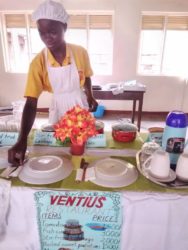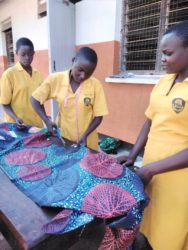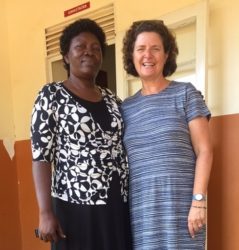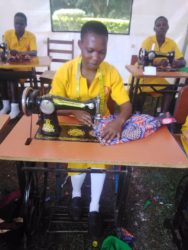
When you think of kids in a classroom in Africa, you may think of them memorizing facts and figures. And tests, lots and lots of tests. Indeed, that’s how it was – until recently. Even before the pandemic, educators were reconsidering what and how secondary school youth were learning and paying closer attention to teacher quality. School closures during the coronavirus gave educators all over the globe the opportunity to rethink and retool.
Uganda is the “youngest” nation in the world with nearly half of its population under the age of 14 and 78% under age 30. The reality is just a small percentage will finish high school completely (instead stopping after four years, also called Ordinary Level) and fewer still will pursue a university education. The implication is clear: youth need applicable and practical skills that will enable them to earn a sustainable income and live independently.
African Girls Can students have progressed to nursing school and building construction programs after earning their Ordinary Level Certificates. Those who are still at St. Katherine are benefitting from an updated “Competence Based” Curriculum, which includes a requirement to take one of 8 practical subjects such as Nutrition and Food Technology or Design and Textiles. One day, they may run a café, catering business, or tailoring shop, in addition to knowing how to provide nutritious meals and make clothes for their families.
Understanding the New Lower Secondary Curriculum

To adopt a learner-centered approach to teaching and learning, the Ugandan Ministry of Education and Sports reviewed the curriculum with an aim at reducing content overload and number of hours in the classroom. The Competence Based Curriculum has an objective of “producing citizens with employable skills who are competitive in the labor market and highly productive for self and society.”

School Headmistress Madame Nangwala Rose Nakwagala explains, “We now have students learning on the job. By Senior Three, they will be equipped with the skills that can usher them into the community and into the job market.”
The new curriculum focuses on workplace skills that allow learners to adapt to change and cope with the challenges of life in the 21st century. Embedded in ALL subjects* are critical thinking and problem solving, creativity and innovation, communication, cooperation, self-directed learning, mathematical computation, and Information and Communication Technology (ICT) proficiency.
*Compulsory subjects at St. Katherine are English, Mathematics, History/Political Education, Geography, Physics, Biology, Chemistry, Physical Education, Religious Education, Entrepreneurship, Kiswahili.
In addition, students are exposed to cross-cutting issues which help the learner understand the connection between specific subjects and life. These include: environmental awareness, health and wellness, diversity and inclusion, mixed abilities, socio-economic challenges, citizenship and patriotism.
The curriculum is a learner-centered approach which puts emphasis on:
- The learner as an individual, rather than the class as a whole with the focus on the teacher.
- What the learner can do rather than what she knows.
- Recognizing the achievements made by the learner, however small they may be.

A Competence Based Curriculum measures the achievement of an individual learner against a defined objective and aims to find out how well the learner can use the acquired knowledge and skills in real life situations. Gone are class rankings based solely on exams, instead each person’s performance is compared to the standard without comparing to how other learners performed.
Finally, parents are recognized as key stakeholders in the learning process, along with teachers and the child herself. Various types of parental support are essential: psycho-social, financial (tuition and material requirements), and moral. Learning opportunities must be augmented at home with a place to study and, most importantly, the time to do it. Youth in Uganda are generally put to work at home tending to crops and caring for younger siblings.
 African Girls Can commends the Ministry of Education and our partner school St. Katherine for implementing these sweeping changes to how secondary school students in Uganda are taught and evaluated. It shows real consideration for the individual and her unique learning style, as well as an effort to bring out each student’s maximum potential and ability to thrive as an adult.
African Girls Can commends the Ministry of Education and our partner school St. Katherine for implementing these sweeping changes to how secondary school students in Uganda are taught and evaluated. It shows real consideration for the individual and her unique learning style, as well as an effort to bring out each student’s maximum potential and ability to thrive as an adult.
Learn more about changes in Education globally.

